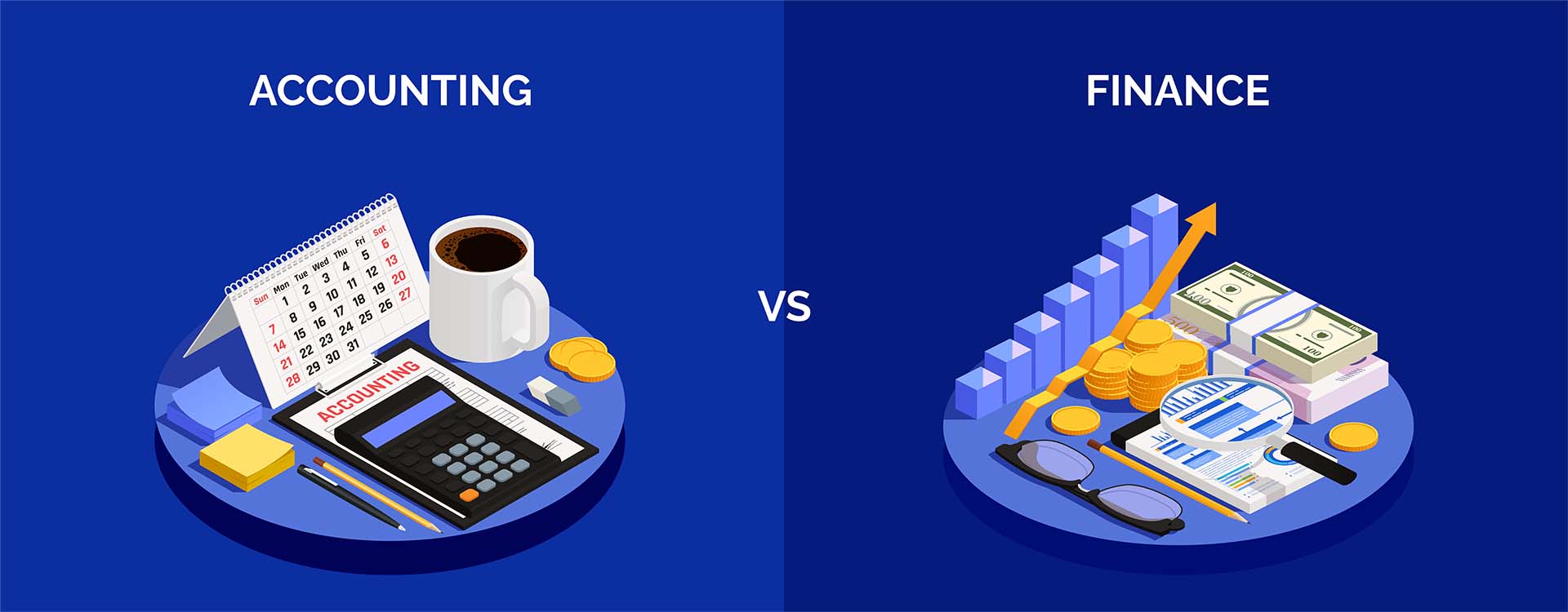Finance Vs Accounting In the world of business, the terms “finance” and “accounting” are often used interchangeably. However, they are distinct fields with unique functions, goals, and processes. While both deal with the management of money, their focus, career paths, and practical applications differ significantly.
This article explores the major differences between finance and accounting to help students, professionals, and business owners gain a clearer understanding of how each discipline operates.
What is Finance?
Finance is the broad field that deals with the management, creation, and study of money, investments, and other financial instruments. It focuses on how individuals, businesses, and governments allocate resources over time and manage risks.
Core Functions of Finance
- Investment Planning: Evaluating opportunities for potential returns.
- Risk Management: Identifying and mitigating financial risks.
- Capital Budgeting: Making long-term investment decisions.
- Financial Planning: Creating strategies to meet financial goals.
- Portfolio Management: Managing assets to maximize returns.
Types of Finance
- Personal Finance: Managing individual finances like savings and retirement.
- Corporate Finance: Managing a business’s financial resources and capital structure.
- Public Finance: Government-related financial management like taxation and budgeting.
What is Accounting?

Accounting is the systematic process of recording, classifying, summarizing, and interpreting financial transactions. It ensures that financial statements are accurate and comply with regulatory requirements.
Core Functions of Accounting
- Bookkeeping: Recording day-to-day financial transactions.
- Financial Reporting: Preparing balance sheets, income statements, and cash flow reports.
- Tax Accounting: Ensuring accurate tax calculation and compliance.
- Auditing: Verifying the accuracy and legality of financial records.
- Cost Accounting: Analyzing internal cost structures to improve efficiency.
Branches of Accounting
- Financial Accounting: Reporting financial data to external stakeholders.
- Managerial Accounting: Analyzing financial data for internal decision-making.
- Forensic Accounting: Investigating financial discrepancies and fraud.
- Tax Accounting: Preparing tax returns and planning for tax obligations.
Major Differences Between Finance and Accounting
Understanding the differences between finance and accounting is essential for choosing a career path or improving business management practices.
1. Focus and Scope
- Finance: Concerned with the future—forecasting, planning, and investment decisions.
- Accounting: Rooted in the past and present—recording and reporting historical data.
2. Decision-Making
- Finance Professionals: Make strategic decisions about investments and capital allocation.
- Accountants: Provide data and analysis that aid financial decision-making.
3. Primary Objectives
- Finance: Maximize wealth and return on investment.
- Accounting: Ensure financial accuracy and compliance.
4. Tools and Techniques
- Finance Tools: Financial models, valuation methods, risk analysis tools.
- Accounting Tools: Ledgers, accounting software, tax calculators.
5. Educational Path
- Finance Degrees: Focus on economics, statistics, and investment analysis.
- Accounting Degrees: Emphasize auditing, financial reporting, and regulatory compliance.
6. Certifications
- Finance Certifications: CFA (Chartered Financial Analyst), CFP (Certified Financial Planner).
- Accounting Certifications: CPA (Certified Public Accountant), CMA (Certified Management Accountant).
Similarities Between Finance and Accounting
Despite their differences, finance and accounting share several similarities that make them complementary fields.
Common Elements
- Financial Data: Both rely heavily on accurate financial data.
- Regulatory Frameworks: Compliance with financial laws and standards.
- Ethical Considerations: Both require high ethical standards and integrity.
- Analytical Skills: Professionals in both fields must possess strong analytical abilities.
Career Paths in Finance vs Accounting
Choosing between finance and accounting can depend on your interests, strengths, and career aspirations.
Career Options in Finance
- Financial Analyst
- Investment Banker
- Portfolio Manager
- Risk Manager
- Financial Planner
Career Options in Accounting
- Auditor
- Tax Consultant
- Forensic Accountant
- Management Accountant
- Budget Analyst
Salary Expectations
Finance roles often come with higher earning potential due to the strategic nature of the work, especially in investment and risk management. Accounting roles, while more stable, may offer slower growth unless one advances to a senior position like CFO or controller.
Skill Sets Required
Key Skills for Finance
- Strategic thinking
- Risk analysis
- Data interpretation
- Communication
- Investment acumen
Key Skills for Accounting
- Attention to detail
- Regulatory knowledge
- Numerical proficiency
- Organizational skills
- Time management
Educational Requirements
Most finance and accounting careers require at least a bachelor’s degree. Advanced roles often need professional certifications or a master’s degree.
Finance Degrees
- Bachelor of Finance
- MBA in Finance
- MSc in Financial Engineering
Accounting Degrees
- Bachelor of Accounting
- Master of Accounting
- MBA in Accounting
Software and Tools

Finance Tools
- Excel for financial modeling
- Bloomberg Terminal
- Financial simulation software
- Portfolio management platforms
Accounting Tools
- QuickBooks
- Xero
- SAP
- Microsoft Dynamics
Regulatory Bodies and Compliance
Finance and accounting professionals must understand and adhere to laws, though their focus differs.
Finance Regulations
- Securities regulation
- Investment advisory laws
- Risk management frameworks
Accounting Regulations
- GAAP (Generally Accepted Accounting Principles)
- IFRS (International Financial Reporting Standards)
- Tax codes and audit standards
Trends Impacting Finance and Accounting

Finance Trends
- Fintech innovations
- Cryptocurrencies
- Sustainable investing
- Decentralized finance
Accounting Trends
- Automation in bookkeeping
- AI in auditing
- Cloud-based accounting
- Real-time reporting
When to Use Finance or Accounting in Business
Knowing when to use finance or accounting expertise can enhance business operations.
Finance is Best For:
- Long-term strategic planning
- Investment analysis
- Budget forecasting
Accounting is Best For:
- Day-to-day financial tracking
- Legal compliance
- Preparing financial statements
Also Read : Understanding Financial Markets: A Beginner’s Guide
Conclusion
Finance and accounting are critical to the success of any organization. While accounting focuses on the precise recording and reporting of financial transactions, finance looks ahead to guide strategic decisions and investments. Understanding these differences can help individuals choose the right career path and businesses make informed decisions that lead to growth and sustainability.
Whether you’re a student exploring career options or a business owner aiming to optimize operations, knowing the unique roles and goals of finance and accounting is vital. Both disciplines offer rewarding careers and play complementary roles in the financial health of an organization.
FAQs
1. Can I switch careers between finance and accounting?
Yes, with additional education or certifications, many professionals transition between these fields.
2. Which is harder—finance or accounting?
It depends on your strengths. Accounting requires precision and detail, while finance demands strategic thinking and forecasting.
3. Is accounting better for job stability?
Accounting roles often offer more predictable career paths and job security.
4. Do finance jobs pay more than accounting?
In general, finance jobs, especially in investment and risk, tend to offer higher salaries.
5. What degree should I pursue for a finance career?
A bachelor’s or master’s in finance, economics, or a related field is recommended.









